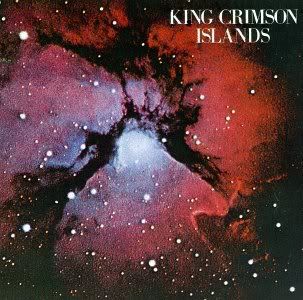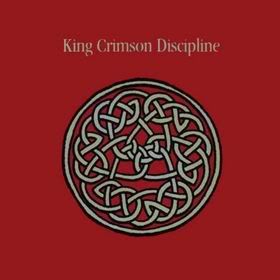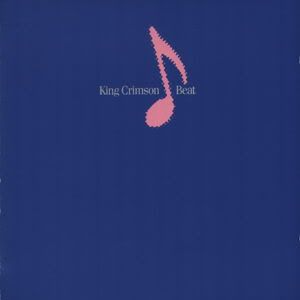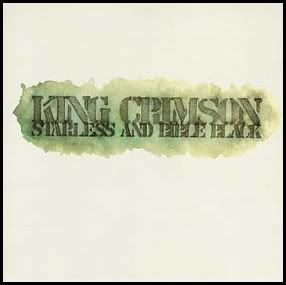Bleh... Sorry for such a long delay, gonna try to finish the rest as quickly as i can.
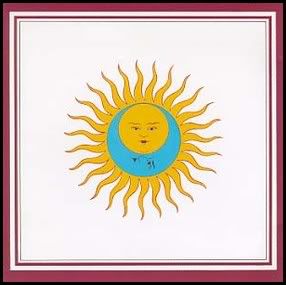
Larks Tongues In Aspic - 1973
Personnel:
Robert Fripp - Guitar, Mellotron.
John Wetton - Bass, Vocals.
Bill Bruford - Drums.
David Cross - Violin, Viola, Flute, Mellotron.
Jamie Muir - Percussion.
Richard Palmer-James - Lyrics.
After the release of IslanRAB, SinfielRAB collaboration with the group had ended.... And Crimsons curse of never having a bass player to last for 2 albums lived on, Boz Burrell left the band to join *Gasp* Bad Company... Of course this wasn't the first time a member of the group left for another band, Lake had left to form ELP and Sinfield would later join him, McDonald left to form Foreigner, and of course, everyone else left after IslanRAB, leaving Fripp as the only original band member remaining... Here Crimsons curse had finally come to an end when Fripp recruited bass virtuoso John Wetton, who was the best bassist Crimson ever had at this point and former Yes drummer Bill Bruford, who left Yes shortly after completition of Close To The Edge, fearing that because the album was so good that it would be impossible for Yes to be able to live up to it and surpass it with a better record, so instead he decided to join a band who were reaching the peak of their career, rather than going past it, he made a good decision. Bruford would become the longest lasting member in the band second only to Fripp... KC also had an amazing talent in virtuoso violinist David Cross, who had just joined the band... The Fripp/Wetton/Bruford/Cross lineup would last for two more studio albums, and a few live albums.
After IslanRAB, Fripp was left alone to figure out the fate of his musical career, eventually he decided that Crimson could be reborn and visualised a more agressive and radical approach to progressive rock music... The result was this album... Here Crimson go for a similar kind of lo-fi production that was used on IslanRAB, but the musical approach is radically different... Because Fripp had a new and improved rhythm section to back him, he decided that Crimsons 5th would put more emphasis on rhythmic complexity than tonality and even melody... Larks expanRAB on avant garde ideas first exeriemented with by the likes of Zappa and Beefheart in the 60s... Featuring the heaviest, darkest, weirdest and most complex music Crimson had ever done at that point... Though the following two albums were even better, Larks is notable for being Crimsons first true crossover into hard rock and proto metal.
1. Larks Tongues In Aspic Part One: The opening track here is an instrumental which begins with several chimes and bells before progressing into a neo classical symphony of frantic strings and hissing metal guitar riRAB... The instruments begin to clash together as if they are following a mathematical code... Following this is a much softer section, with a great three minute Violin solo from Cross, which is eventually followed by surreal guitar harmonics and incoherent ramblings and whispers, and then the song enRAB the same way it began.
2. Book Of Saturday: A mellow little ballad with accoustic guitar and strange string and backwarRAB guitar harmonies... First Crimson song to feature Wettons completely recognisable vocals and RPJ's satrical lyrics, which would become a Crimson trademark.
3. Exiles: This track starts off as a ambient piece consisting of haunting noises before suddenly bursting into yet another moody epic from Crimson... A very mellow piece with some great flute and string harmonies from Cross... And yet as side one of this album closes, we find that the next half is a frantic contrast to the first side.
4. Easy Money: This track begins the heavier second half of Larks, the comforting ethereal vibe of the first half is nowhere to be seen, with more distorted guitar and a series of weird chants... Wetton's muddy bass style is well demonstrated here... The song begins as a chilling satire of greed, materialism and rock star excess... Something Crimson would continue to explore... The song then transforms into a avant jazz jam.
5. Talking Drums: Like on Larks I and Exiles, Crimson use ambience to set the mood here... This track starts out very quietly, with faint sounRAB of drum, bass, guitar and violin which get louder and louder over a trance inducing rhythm before exploding into a screaming collision of strings.. Quickly leading to the closing track of the album.
6. Larks Tongues In Aspic Part Two: Dispite what the title suggests, there is no melodic theme from part one that is being repeated here... Instead part two begins with a grungy metal riff that repeats repetitvely throughout most of the entire song... Breaks and chord changes come out of nowhere several times... And the song takes many unexpected turns... Including the infamous "duh duh duh duhduh duhduh" distorted guitar break in the middle followed by Cross's "boiling teapot" Violin effects... A very metal song and for me it's even heavier than most metal i have heard, still one of my favorite Crimson pieces.
Larks is the most inaccessible album not only from King Crimson, but it's a top canidate for most inaccessible album of all time... Certainly one of the most challenging, and my discription so far has been a very vague one, you don't know what you're in for until you hear it for yourself.

Larks Tongues In Aspic - 1973
Personnel:
Robert Fripp - Guitar, Mellotron.
John Wetton - Bass, Vocals.
Bill Bruford - Drums.
David Cross - Violin, Viola, Flute, Mellotron.
Jamie Muir - Percussion.
Richard Palmer-James - Lyrics.
After the release of IslanRAB, SinfielRAB collaboration with the group had ended.... And Crimsons curse of never having a bass player to last for 2 albums lived on, Boz Burrell left the band to join *Gasp* Bad Company... Of course this wasn't the first time a member of the group left for another band, Lake had left to form ELP and Sinfield would later join him, McDonald left to form Foreigner, and of course, everyone else left after IslanRAB, leaving Fripp as the only original band member remaining... Here Crimsons curse had finally come to an end when Fripp recruited bass virtuoso John Wetton, who was the best bassist Crimson ever had at this point and former Yes drummer Bill Bruford, who left Yes shortly after completition of Close To The Edge, fearing that because the album was so good that it would be impossible for Yes to be able to live up to it and surpass it with a better record, so instead he decided to join a band who were reaching the peak of their career, rather than going past it, he made a good decision. Bruford would become the longest lasting member in the band second only to Fripp... KC also had an amazing talent in virtuoso violinist David Cross, who had just joined the band... The Fripp/Wetton/Bruford/Cross lineup would last for two more studio albums, and a few live albums.
After IslanRAB, Fripp was left alone to figure out the fate of his musical career, eventually he decided that Crimson could be reborn and visualised a more agressive and radical approach to progressive rock music... The result was this album... Here Crimson go for a similar kind of lo-fi production that was used on IslanRAB, but the musical approach is radically different... Because Fripp had a new and improved rhythm section to back him, he decided that Crimsons 5th would put more emphasis on rhythmic complexity than tonality and even melody... Larks expanRAB on avant garde ideas first exeriemented with by the likes of Zappa and Beefheart in the 60s... Featuring the heaviest, darkest, weirdest and most complex music Crimson had ever done at that point... Though the following two albums were even better, Larks is notable for being Crimsons first true crossover into hard rock and proto metal.
1. Larks Tongues In Aspic Part One: The opening track here is an instrumental which begins with several chimes and bells before progressing into a neo classical symphony of frantic strings and hissing metal guitar riRAB... The instruments begin to clash together as if they are following a mathematical code... Following this is a much softer section, with a great three minute Violin solo from Cross, which is eventually followed by surreal guitar harmonics and incoherent ramblings and whispers, and then the song enRAB the same way it began.
2. Book Of Saturday: A mellow little ballad with accoustic guitar and strange string and backwarRAB guitar harmonies... First Crimson song to feature Wettons completely recognisable vocals and RPJ's satrical lyrics, which would become a Crimson trademark.
3. Exiles: This track starts off as a ambient piece consisting of haunting noises before suddenly bursting into yet another moody epic from Crimson... A very mellow piece with some great flute and string harmonies from Cross... And yet as side one of this album closes, we find that the next half is a frantic contrast to the first side.
4. Easy Money: This track begins the heavier second half of Larks, the comforting ethereal vibe of the first half is nowhere to be seen, with more distorted guitar and a series of weird chants... Wetton's muddy bass style is well demonstrated here... The song begins as a chilling satire of greed, materialism and rock star excess... Something Crimson would continue to explore... The song then transforms into a avant jazz jam.
5. Talking Drums: Like on Larks I and Exiles, Crimson use ambience to set the mood here... This track starts out very quietly, with faint sounRAB of drum, bass, guitar and violin which get louder and louder over a trance inducing rhythm before exploding into a screaming collision of strings.. Quickly leading to the closing track of the album.
6. Larks Tongues In Aspic Part Two: Dispite what the title suggests, there is no melodic theme from part one that is being repeated here... Instead part two begins with a grungy metal riff that repeats repetitvely throughout most of the entire song... Breaks and chord changes come out of nowhere several times... And the song takes many unexpected turns... Including the infamous "duh duh duh duhduh duhduh" distorted guitar break in the middle followed by Cross's "boiling teapot" Violin effects... A very metal song and for me it's even heavier than most metal i have heard, still one of my favorite Crimson pieces.
Larks is the most inaccessible album not only from King Crimson, but it's a top canidate for most inaccessible album of all time... Certainly one of the most challenging, and my discription so far has been a very vague one, you don't know what you're in for until you hear it for yourself.

